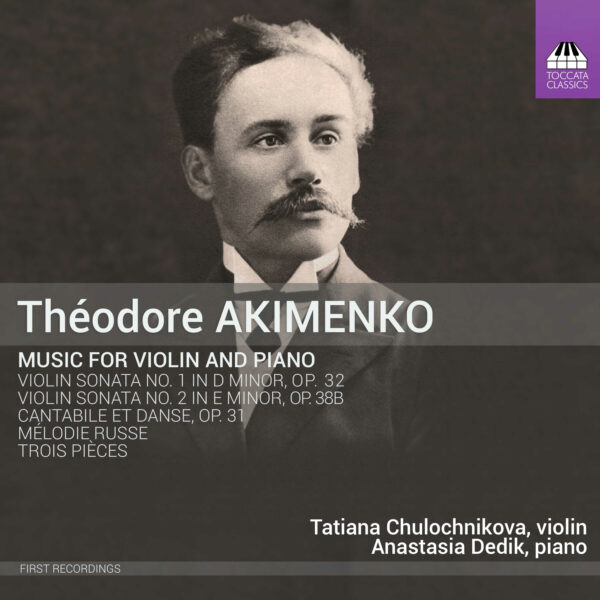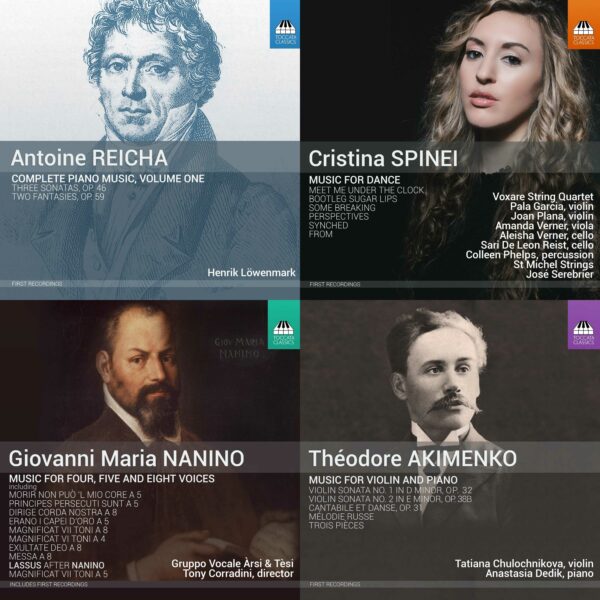Théodore Akimenko: Music for Violin and Piano
The Ukrainian Fyodor Akimenko (a.k.a. Fedir Yakymenko, 1876–1945) was born in Kharkiv, studied in St Petersburg with Balakirev, Lyapunov and Rimsky-Korsakov and was Stravinsky’s first teacher. Akimenko’s music has much in common with that of Glazunov and Grechaninov and, like them, in 1923 he chose exile over a prominent teaching career in St Petersburg, finally settling in France in 1929, where he became Théodore and continued his generous output of lyrical, Romantic music.
Tatiana Chulochnikova, violin
Anastasia Dedik, piano
Listen To This Recording:
-
Violin Sonata No. 1, Op. 32
- I Andantino
- II Andante con moto
- III Allegro risoluto
- Melodie russe
- No. 1 Cantabile
- No. 3 Danse
- I Allegro
- II Andante
- III Allegro molto
- No. 1 Valse
- No. 2 Doux reve
- No. 3 Danse rustique
Melodie russe
Trois Pieces, Op. 31
Violin Sonata No. 2, Op. 38b
Troi Pieces


Fanfare Magazine :
‘This disc presents the approachable music of a composer surely known to few, but deserving of a wider appreciation. … From its [The Violin Sonata No. 1] modest, quiet beginnings, the music gradually expands outwards to technically challenging writing, ably met here by the sweet-toned Tatiana Chulochnikova and the excellent pianist Anastasia Dedik. Dedik has a lovely staccato touch, which when set against Chulochnikova’s endless bow makes for a gorgeous effect. … The Second Sonata… is a more mature work. … Chulochnikova’s way of hitting high notes right in the middle gives the performance a great sense of confidence. There is a fragmentary side to Akimenko’s writing here that is actually fascinating. … The drone effect and the melodic profile at one point seems to invoke the world of Bartók; some of the writing for piano as the movement progresses is decidedly muscular. … The Mélodie russe of around 1925 is a sprightly slip of a piece based on a melody with decidedly folk leanings. … the violin’s throaty lower register incredibly eloquent; high register contrast is delivered with impeccable tuning here by Chulochnikova. … Lied ohne Worte [from Trois Pièces], captivatingly delivered by Chulochinikova; the Third [from Trois Pièces] is a wild, sometimes cheeky dance modeled on a Ukrainian hopak. We do, however, have all three of the set comprising “Valse,” “Doux rêve,” and “Danse rustique,” and it is this set that rounds off the disc. All three pieces are composed with real skill and with a light touch; it is clear both performers here are having fun, too. Choluchnikova commendably avoids over-egging her pudding at all times. This is a fascinating release, one which presents most of Akimenko’s music for violin and piano, all in first recordings.’
—Colin Clarke,Fanfare, November/December 2016
Fanfare Magazine :
‘As Baley points out, all the pieces except for the Mélodie russe come from pre-revolutionary Russia; the First Violin Sonata’s third movement, for example, fairly bristles with folklore dance rhythms. Chulochnikova captures the spirit of these and viscerally realizes the excitement inherent in the final page. The Mélodie russe, according to the notes, started its life before 1914 but reached its final form and came to be published only in 1925. This piece, direct in its expressivity, makes a direct and heartfelt impression in the duo’s performance.Equally (or perhaps even more) direct, the melodious Cantabile from the Three Pieces, op. 31 (1909), receives an ardent performance; … The Second Sonata… represents a step into the shadows—Baley points out its more elusive and fragmentary melodies and its flirtation with the Impressionistic mien, and Chulochnikova and Dedik seem highly sympathetic to this less outgoing manner. They are even more persuasive advocates, perhaps, for the slow movement, and match the strenuousness of the finale’s opening and the relative bleakness of its conclusion. In the Three Pieces… Akimenko seem to have found his most authentic voice. The duo correspondingly makes each piece sound absolutely assured and tightly integrated stylistically—a great deal more so, many may feel, than composer and performers did (or could) in the sonatas. …listeners should find the hour they spend with duo and composer to be both interesting and at times richly introspective. Recommended.’
—Robert Maxham, Fanfare Magazine, January/February 2017
Christopher Davies :
Having recently heard the premier performance of his cello concerto with the Bournemouth S.O I was intrigued to hear more of this sadly neglected composer. This CD was a joy to listen to, hopefully a recording of the cello concerto will soon be available
MusicWeb International :
‘Graced by fine notes, this charming music is played with precision by the two performers.’
—Jonathan Woolf, MusicWeb International